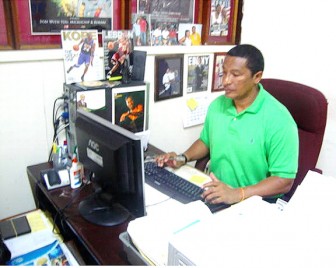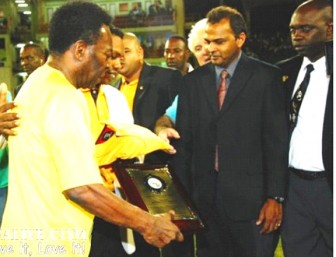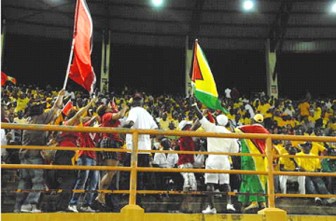Attracting sustained private sector financial sponsorship for sport in Guyana, given a business community that comprises mostly small and medium-scale business enterprises is a challenge which only a handful of local sports organisations have been able to meet.
The larger business entities have, by and large been generous though, over time, some have shown clear signs of donor fatigue. Marketing budgets which customarily include funds for sports budgets have become more modest, particularly among large local companies with captive markets. For those companies, giving to sport has become less a matter of marketing and more a matter of patronage. While some of the smaller enterprises derive modest promotional spinoff from giving to sport, their problem reposes in their ability to give.
Kashif Mohammed agrees that while several business houses are often prepared to chip in with modest support to “an individual sports event or a local team travelling abroad” it is the handful of larger companies that are “the bread and butter of sports sponsorship.” Some names, he says, come to mind. “There is Banks DIH Ltd, GT&T, Digicel, DDL, Ansa McAl and a few others.” He makes the point too that the companies that give the most are “those who have the most to gain given the widespread appeal of the goods and services that they offer.”

Mohammed should know. For more than 20 years he and his colleague and business partner, Aubrey ‘Shanghai’ Major have consistently attracted private sector sponsorship for the Annual Kashif and Shanghai Football Tournament, widely believed to be the single largest sports event in the country. It began with a $4,000 contribution from Banks DIH Ltd to run off the first ever tournament in 1989. Between then and now the Kashif and Shanghai Organisation has attracted tens of millions of dollars from the business community to run off their highly popular football extravaganza.

What its close ties with the business community has done is to set the Kashif and Shanghai Organisation apart from what is sometimes seen as a ‘begging bowl’ culture in national sport. Local sports events rely heavily on a kind of ‘cap-in-hand’ syndrome, a practice of approaching business houses with urgent appeals for assistance rather than proposals that carry with them promotional opportunities for the contributing agencies. “One of the things that always bothers me is to see national athletes going from one business place to another trying to raise money for an air ticket to travel to an event outside Guyana or to meet the cost of their hotel bills. I think that is quite a shame,” Mohammed says.

It is the failure of local sports organisations to market themselves effectively that has been the biggest hindrance to their growth and development. That, at least, is what Mohammed believes. “No sports organisation in Guyana can be sustained except it has a financial base. As it happens you have to look to the private sector for money and business being what it is, you will not get very far except you have something to sell to the business community.”
It is this philosophy that has informed the relationship between the Kashif and Shanghai Organisation and the local business community. The rewards are readily apparent in the constant growth of the annual tournament, the incremental increase in prize monies and the expanding audiences. “That is what we have done best. We have raised the profile of football, we have made the game more popular and more people have been coming to our games. Where I suppose we have differed from other sports organizations has been in our ability to do things that make our events attractive as a marketplace. We get the support from the business community because what we do markets their products.”
The success which the Kashif and Shanghai Organisation has had in marketing its annual tournament has attracted the attention of the wider sports and entertainment community. In local entertainment circles Kashif and Shanghai have become the go to duo for the putting together of marketing packages for major entertainment events involving international artistes, the Beres Hammond Show earlier this year being one of their most recent promotional efforts. A few years ago the duo teamed up with Blackheart Productions in St Lucia to stage an intra-regional, club level football tournament. “That, for us, was a sign that people in the Caribbean were getting to know about our work in marketing sports and entertainment in Guyana,” Mohammed says.
Last Friday saw what football fans say was one of the largest crowds ever to witness a football match in Guyana. Guyana’s Golden Jaguars was competing against Trinidad and Tobago’s Soca Warriors and it was obvious from the sea of yellow shirts in the stands that the event had benefited from a period of sustained and aggressive marketing. The spectacle, it transpired, was the handiwork of the Kashif and Shanghai Organisation. It appears that the Guyana Football Federation acknowledged the accomplishments of Kashif and Shanghai and decided to assign it this important undertaking.
There are a few considerations that make the Annual Kashif & Shanghai Tournament attractive to the business community. First the event is run off during the three-week period beginning early in December and concluding on New Year’s Day – the Christmas season. Second, the event takes place over a relatively short period which means the sponsorship support is sporadic rather than sustained. Third, matches are played in areas across much of coastal Guyana, a circumstance that provides business houses with opportunities to promote their goods and services to wider audiences. Then there is the final of the Annual Kashif & Shanghai Football Tournament. Played these days at the National Stadium at Providence, the event is regarded as the blue ribbon occasion on the national sports calendar. In various years the tournament has attracted major sponsorship from Banks DIH Ltd, the Guyana Telephone & Telegraph Company, and, more recently, from the Trinidad and Tobago-owned Ansa Mc AL Ltd.
Mohamed believes the biggest single accomplishment of the tournament is the role it has played in broadening the base of popular support for football in Guyana. He points to a time, two decades or so ago when, he says, “football had its people.” By that he means that followers of the game comprised limited numbers of passionate fans. “What we have been able to do is to create a wider interest in the game that cuts across things like age and gender. We have entire families coming to our games these days; we have people looking to entertain themselves. It’s all about the type of show that we offer.” His point is well made. The group invests heavily in advertising the tournament, particularly the final. Live entertainment by local and international artistes has become an integral part of the final. “It’s what the crowds want and what our sponsors are looking for. If what you offer can help sell their products and if it is presented professionally they will support you.”
A meticulous planner, Mohammed has cultivated a flair for the marketing of sport and entertainment by studiously monitoring the relationships between major sports clubs and some of the global corporate giants. He talks knowledgably about the shirt sponsorship deal enjoyed by the English Premier League football Club Manchester United, worth millions of pounds and about another English Premier League giant, Arsenal, which boasts a nine-figure combined stadium naming rights and shirt sponsorship deal. He is familiar too with Barclays Bank’s 82 million-pound deal with the English Premier League and with the huge investments which companies like Coca Cola, Nike and McDonald’s make in European and World Cup football.
All this, of course, is light years away from the modest relationships between the local business community and the Kashif & Shanghai Organisation, though, as far as Mohammed is concerned, understanding what he describes as “the big time” is critical to developing relationships in the local business community. Part of his time, he says, is spent monitoring important developments in the business community. “Growth in business means that there are possibilities for us to expand our own business support base,” he says. “We have to look at the types of businesses that are created and try to determine how our promotional interests can match their commercial interests. We spend time discussing those issues before we approach companies with proposals. At the same time we work on how we can grow our tournament to make it more attractive to sponsors.”
When you ask Mohammed about the money which the organisation rakes in from private sector sponsorship he frowns. “There are rumours that we make millions. That’s not true. The people who say that don’t really understand what we are about. Nobody outside of the organisation ever stops to think about why we have been successful in attracting sponsors. It’s because we plan and put in the hard work. There’s a cost to hard work and, frankly, after the whole thing is over you come to recognise that the rewards are quite small. Even if the rewards were bigger, however, why envy us for doing what we do for local football and local entertainment on the whole?” After that he is finished with the issue.
Mohammed, who serves as the organisation’s marketing guru, says he works on “the simple principle that you never get more than you give.” He says that the branding of the organisation was not “an overnight job” and that in some cases it took years to “sell” the organisation to sponsors. “Part of the challenge had to do with branding the organisation; causing the sponsors to treat us as a respected and well-organised operation. Sometimes sports events can prove to be one-day wonders. We are an annual tournament and we have to persuade the business community that we can do it over and over again.”
Two years ago the Kashif & Shanghai Organisation took a decision aimed at further raising its profile; it took on the administratively complex and financially demanding task of hosting the Brazilian football legend King Pele for the tournament’s opening ceremony that year. Mohammed declines to say what the visit – including the charter of a private jet for the football legend – cost. “Let’s just say it was a significant investment. But that is what this business is all about. At least that’s how we see it.” He believes that the investment has paid off. “The image of both the organisation and the tournament has benefited. People now people see us differently. A number of international sports organisations have heard about the Kashif and Shanghai Organisation. The Indian football team that visited Guyana earlier this year came here as a result of the international attention that came out of the Pele visit to Guyana. There are other potential ties with international sports promotion organisations which the organisation is currently exploring.
When you ask Mohammed about the secret of the organisation’s success as a sports marketing entity he thinks about it before he responds. “We believe in planning. We try to think through every idea that comes to us. We believe that our most important task is to persuade people that we can do what we say we can do. That is why every time we host a successful tournament it helps us. What success does is to sell us to our sponsors.”
Planning the Kashif Shanghai Tournament is a multi-faceted exercise. Apart from planning the event itself there is the matter of selling the tournament, bringing sponsors on board to help meet the costs associated with the tournament which, this year, includes prizes valued at more than $5 million. “Putting the fixtures together and organising the teams is the less difficult part of the exercise. It’s engaging sponsors that poses a challenge. Every year it’s different. Our major sponsors might have had a difficult year and what that means is that they might not match the previous year’s sponsorship levels. That means we must find other sponsors.”
Finding other sponsors can be a painstaking exercise. “Our sponsors have been generous but that does not mean that they do not have a business interest. What this means is that we must prepare proposals that make sense to them. I believe that sponsors are growing tired of people who just come begging and have nothing to offer. The major deals that we have made including those with GT&T and Ansa Mc Al, for example, have all been based on proposals and discussions and sometimes modifications to proposals before sponsorship is agreed.”
Meanwhile, Mohammed says the Kashif & Shanghai Organisation is open to sports marketing pursuits outside the realm of its own tournament. “After last Friday’s game against Trinidad and Tobago we are hoping that the Guyana Football Federation (GFF) will come to us again when they require another such marketing venture. In addition to that we are prepared to work in other sports. One of the things that we have been able to do for football is to embrace new audiences; people who had not previously been interested in the game. It’s the same with other sports. You have to create bigger audiences and that is what attracts the interest of sponsors in the business community.”




